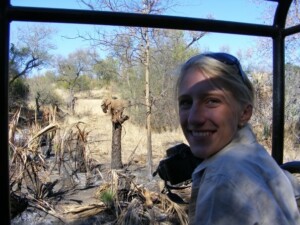
Subscribe to this show on iTunes | Stitcher | Soundcloud
Devasting the African Elephant Population
The ivory trade has been devastating the African elephant population for many decades. For most of us, this issue seems too far away from home to be of any major concern. Not so for Elizabeth Chitwood and her dynamic non-profit organization, Elephantopia.
Elizabeth didn’t set out to become an entrepreneur and change the world – unless you count teaching music as world-changing. But one fateful trip to Africa back in 2009 changed everything. Ever since then, she has been on a mission to halt the ivory trade and save the world’s elephant population.
The Facts About Ivory Trade
Throughout history, ivory has been used in the making of a variety of products such as piano keys, art objects, and jewelry. Demand for these products has fueled a practice that today sees one elephant killed every 15 minutes. Put another way, that’s 100 elephants killed every single day just so their tusks can be harvested. In the 1970s there were nearly 370,000 elephants in Tanzania. Today, it is estimated that there are around 400,000 elephants left on the entire African continent.
The rate of elephant killings outpaces their ability to reproduce. An elephant gives birth to only one offspring after a 22-24-month gestation period. It seems inevitable that parts of Africa will see these animals wiped out completely within a decade. As well as fueling the rapid extinction of a species, the ivory trade also helps to fund terrorist organizations such as the LRA, Al Shabaab, and Kony.
The Education
Most people might profess a love of elephants. However, like the Elizabeth of pre-2009, few people understand the importance of these animals to the ecosystem or the severity of their plight. For Elizabeth Chitwood, the trips to Africa’s national reserves began a journey of discovery and education that would lead her to set up a world-changing organization. She set out to, not only educate herself but also other Americans as well.
The Elephantopia blog initially served as a way for Elizabeth to simply record some of her thoughts and ideas on the issues of poaching. However, the website soon became part of a much larger cause. It began with a 2013 petition to the Pope, asking for the Catholic Church, one of the world’s largest religious institutions, to take a stand against the use of ivory in religious art. With nearly 12,000 signatures on that petition, Elizabeth soon found herself on the radar of David Sheldrick of the Wildlife Foundation.
That year, Wildlife Foundation had begun an initiative called Global March for Elephants, and Elizabeth saw it as a great opportunity for the Elephantopia blog to prove its usefulness. It led the organization in a demonstration march in Houston as part of the Wildlife Foundation’s elephant initiative. “Even though Elephantopia was still just a blog at the time,” says Elizabeth, “we managed to sponsor an event in Houston.” The march must have been a success because it led to the mayor of Houston proclaiming October 4, 2013 as “Global March for Elephants Houston Day.”
Through the organization and implementation of this event, Elizabeth was able to meet more “dedicated and inspired elephant advocates,” something that would turn Elephantopia from a “simple blog” into a proactive campaign.
With nearly 12,000 signatures on that petition, Elizabeth soon found herself on the radar of David Sheldrick of the Wildlife Foundation.
 The Campaign
The Campaign
It became clear that Elephantopia could turn into a useful tool in the fight to save the elephants. Along with a group of people that she met at the Houston event, Elizabeth decided to turn her blog into a 501c3 – a tax-exempt non-profit organization. She wanted to turn Elephantopia into a powerful information platform.
Transforming the blog into a reputable non-profit required money. Money which Elizabeth didn’t have. So she turned to a crowdfunding platform, Indiegogo, hoping to raise a few dollars to cover the most pressing expenses. However, as Elizabeth says, “We exceeded what we were going for and realized we should have shot a lot higher.”
An Indiegogo target of $1,400 turned into almost $6,000 within a short time; a testament to people’s innate yearning to get behind a good cause. And so the campaign was off to a flying start.
The Building of Communities for the Future
Elephantopia is entirely run by a team of volunteers. As a result, any money that comes in through donations can be put to work directly on the primary issues. The ivory trade doesn’t just affect elephants, it also devastates communities, damages people’s welfare, and takes away human lives – all issues that Elizabeth is trying to address through her organization.
Elizabeth believes that building a strong community is key to Elephantopia’s success. As such, her main focus now is on developing a community of people who want to create a lasting impact. Her drive and determination to make a change in the world has attracted many other like-minded people along the way. This includes her mentor, Toni Nell a life coach who decided to offer some of her time for free after hearing about the cause.
Tackling the ivory trade is a major challenge. Indeed, Elizabeth Chitwood is not the first to try and eradicate this practice. However, she represents a new breed of entrepreneurs who are prepared to make it their life’s mission to deal with issues that have been left to linger for too many years.
Elizabeth thinks there is no challenge too big if you have a great community of like-minded people around you.
The future for Elephantopia will see the start of an educational after-school project for international students. The aim will be to create a curriculum to educate students who come to the United States about African elephants, the ecosystem, and of course the ivory trade. The students will be asked to complete projects that can be used in awareness building initiatives to raise national attention to the issue.
Furthermore, Elizabeth will be going back to South Africa to volunteer as a research assistant at the Kafue Release Facility, which is run by GRI. She is excited to see what projects may be needed in Zambia and how Elephantopia can partner with GRI to help save elephants and build a better, stronger community there. Elizabeth’s example, attitude, and advice are noteworthy. She says, “Whatever dreams and inspirations you have, don’t try to do it alone because things work better with a community.”
This article was written by Chris Clayton of Writeora and published in issue 2 of Change Creator Magazine.






